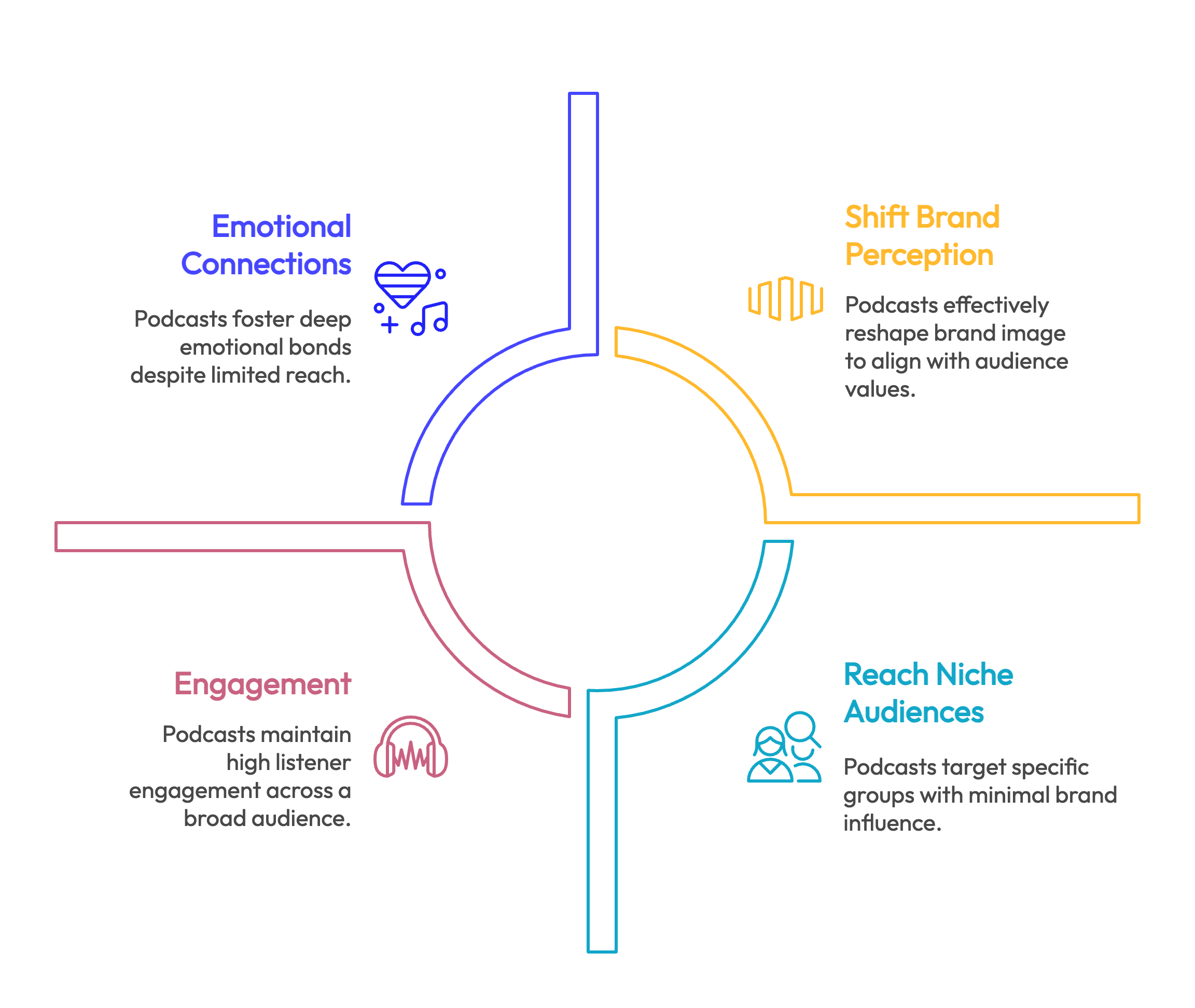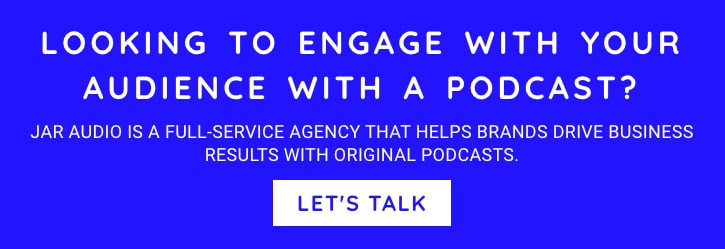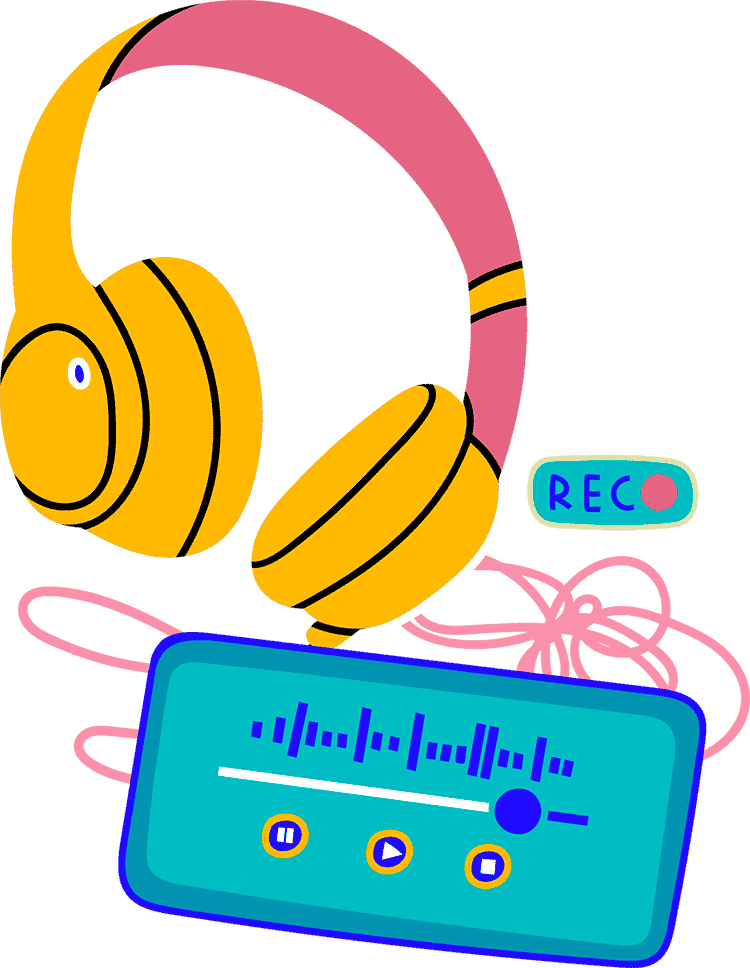Unlock the power of compelling stories to enhance your brand’s connection with your audience
The power of brand storytelling in podcasts
As you explore deeper, you discover that brand storytelling isn’t just about marketing; it’s about creating narratives that showcase your brand’s values, mission, and the impact of your product or service. When done right, it transcends traditional marketing efforts, establishing emotional connections that lead to deeper brand awareness and loyalty. And what better medium than podcasts, which offer an intimate and immersive experience, allowing you to tell your story in a way that feels authentic and engaging?
(see what I’m doing here?)
Why choose podcasts?

A Success Story: “Nice Genes!” by Genome BC
You come across a case study that sparks your interest—“Nice Genes!” by Genome BC.
They had a challenge: their existing podcast delivered dry, science-based content that failed to engage listeners. They wanted to create a new, more engaging podcast targeted at a younger, female audience, entertaining while educating listeners about genomics.
The strategy and execution by JAR Audio
You learn that JAR Audio worked closely with Genome BC through strategic workshops to craft an uplifting, “sciency” podcast. They selected Dr. Kaylee Byers, a scientist and experienced podcaster, as the host. Her background and engaging personality made complex topics accessible. The podcast utilized active storytelling models, incorporating in-the-field and in-the-lab sounds, and dramatized sections to bring points to life. Dense and nuanced sound design leveraged the “theatre of the mind” to keep the audience interested. Educational and entertaining content explained genomics and showcased its impact on various issues, from climate change to racial justice.
The results
The results were impressive:
- Engagement: The podcast achieved a mean consumption rate of 85%, with some episodes reaching 95%. 61% of listeners identified as female, and 46% were aged 25-34.
- Charting Performance: It charted on Canadian Apple Podcast charts, peaking at #6 for Canadian Life Sciences.
- Local Listenership: Over 85% of listeners were based in Canada, surpassing the goal by 10%.
- Awards: The podcast won best podcast at the 15th Annual Shorty Awards in the Science & Technology category, as well as an Audience Honor.
Applying these techniques to your podcast
Inspired by the success of “Nice Genes!”, you decide to apply similar brand storytelling techniques to your podcast. Here’s how you can do it:
- Identify Your Core Message: Determine what story you want to tell and why it matters to your audience. Align it with your brand values and mission.
- Engaging Host and Guests: Choose a host with a compelling personality and expertise. Consider co-hosting formats to introduce dynamic conversations.
- Immersive Sound Design: Use sound effects and music to create an immersive experience, making listeners feel like they are part of the story.
- Educational and Entertaining Content: Balance informative content with entertainment to keep your audience engaged and eager to learn more.
- Inclusive Storytelling: Ensure your podcast reflects diverse perspectives and addresses issues relevant to different cultural communities.
Key elements for a compelling brand story
You focus on the key elements for creating a compelling brand story:
- Authenticity: Your story should be genuine and align with your brand values.
- Emotional Resonance: Create content that connects with your audience on an emotional level.
- Relatability: Make your story relatable to your audience’s experiences and interests.
- Clear Message: Ensure your story has a clear and compelling message that aligns with your brand’s mission and values.
- Strong Characters: Highlight real people or create relatable characters that embody your brand’s ethos.
- Conflict and Resolution: Incorporate elements of conflict and resolution to add drama and keep listeners hooked.
Measuring the success of your podcast
As you implement these strategies, you know it’s essential to measure your success:
- Engagement Metrics: Track metrics like average listen duration, completion rate, and subscriber growth.
- Chart Performance: Monitor your podcast’s ranking on relevant charts.
- Listener Demographics: Analyze listener demographics to ensure you are reaching your target audience.
- Social Media Interaction: Measure the level of engagement your podcast content generates on social media.
- Brand Lift Studies: Conduct brand lift studies to understand how your podcast is impacting brand awareness, perception, and consideration among listeners.
- Feedback and Reviews: Encourage listener feedback and reviews to gain insights into what your audience enjoys and areas for improvement.
Final thoughts
You realize that podcasts offer an unparalleled opportunity for brands like yours to connect with their audience through compelling storytelling. By leveraging the power of audio, you can create content that resonates on an emotional level, enhances brand awareness, and shifts consumer perceptions. You look great in front of your boss. As you can see, strategic storytelling and sound design can transform a podcast into a captivating experience, and you’re ready to apply these lessons to your brand’s journey.
The End
Roger transitioned from a 22 year career in advertising account management to co-founding JAR, a podcast podcast production agency. As CEO of JAR, he propels the company’s growth by prioritizing audience engagement and podcast marketing. Under his guidance, JAR flourishes with a global clientele, aiming to broaden its reach across North America and revolutionize brand connections through immersive storytelling.




